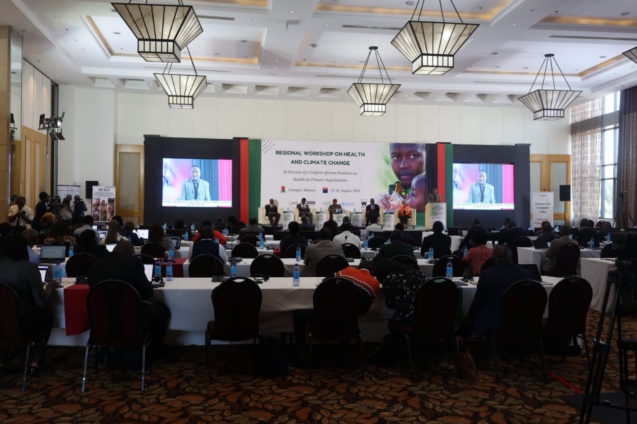"In the global multilateral systems, only 0.5% of the funding is allocated for the health sector. Additionally, less than half of the required needs for water, Sanitation, and Hygiene (WASH) financing are met."
This revelation comes from the Executive Director of the Pan African Climate Justice Alliance (PACJA), who stressed the urgent need for increased financial assistance.
Dr. Mithika Mwenda advocates for augmented funding to bridge these gaps, particularly in the areas of mitigation, adaptation, loss and damage, response measures, and addressing the needs of youth and gender, especially within Africa.
Dr. Mwenda conveyed this message during a regional workshop held in Malawi, where the objective was to establish a unified stance on climate change and its impact on health across Africa.
This event brought together a notable assembly of both state and non-state actors, along with experts and leaders from the health and climate change sectors. The three-day workshop aimed to foster agreement, share insights, and amplify Africa's collective standpoint on health within the context of climate change. The ultimate goal is to nurture sustainable and comprehensive policies that prioritize both health and the environment.
Dr. Githinji Gitahi, CEO of AMREF Health Africa, emphasized the need to fundamentally integrate health into the climate justice dialogue, highlighting that this integration can lead to more comprehensive strategies that protect communities' well-being while simultaneously addressing the global climate crisis.
"By doing so, we can foster more comprehensive strategies that safeguard the well-being of communities while addressing the global climate crisis," he said.
Ephraim Mwepya Shitima, Chairperson of the African Group of Negotiators (AGN), lent his expertise to underscore the importance of cohesive strategies as countries navigate the complex interconnections between climate change and health. He stressed that charting a course that bolsters resilience and sustainable development is essential.
“It is imperative to chart a course that enhances resilience and sustainable development," he said.
Throughout the workshop, participants from diverse sectors engaged in substantive discussions to cultivate a mutual understanding of Africa's unified stance on health and climate change. This collective perspective aims to influence policy decisions, drive advocacy efforts, and guide collaborative actions leading up to COP28.
The World Health Organization (WHO) also emphasizes the significance of integrating health considerations into climate discussions. This approach serves as a unifying force, leveraging health arguments and evidence to effectively reshape the climate narrative.
Latest Stories
-
Chief of Staff rolls out ‘Walk with Julius’ initiative to encourage healthy living, calls on corporate Ghana to join JoySports Invitational Tournament
1 hour -
NSMQ 2025: St Peter’s SHS claims 4th Eastern Regional title after intense showdown with Okuapeman and Pope John’s
2 hours -
Tera Hodges confirmed as speaker for Africa’s Women’s Day Virtual Celebration 2025
2 hours -
Gospel artiste Terry Johnson releases soulful new single “Ohe yɛ naakpɛɛ”
2 hours -
Nearly 200 Ghanaian students stranded as gov’t owes University of Memphis $3.6m
3 hours -
At least 14 dead in South Korea floods and landslides
4 hours -
You’ve kept to the objective – Chief of Staff Julius Debrah hails MGL
4 hours -
Cape Coast hosts final leg of National Talent Identification Program for Para athletes
5 hours -
ESG and Boardroom Decisions: How Non-Financial Drivers Shape Financial Outcomes
6 hours -
Robust anti-laundering fight critical for regional stability – Veep
10 hours -
Car ploughs into crowd outside LA nightclub, injuring 30
11 hours -
GNAT President calls for parliamentary legislation to protect reinstated PTAs
13 hours -
NPP Abanga blames his NDC twin brother for his misfortune
14 hours -
NPP Abanga breaks ranks to shield NDC twin brother in ‘galamsey’ accusations
14 hours -
Saminu Abdul Rasheed smashes national record again with 9.84s sprint in Georgia
15 hours

